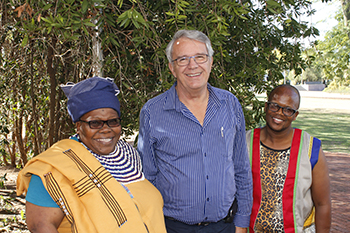Latest News Archive
Please select Category, Year, and then Month to display items
12 January 2024
|
Story Nonsindiswe Qwabe
|
Photo Sonia Small
 Since joining the UFS in 2008, Dr Grey Magaiza has worked extensively on approaches that can foster the socio-economic transformation of societies.
Since joining the UFS in 2008, Dr Grey Magaiza has worked extensively on approaches that can foster the socio-economic transformation of societies.
“The future should be one where communities can decide on their development agenda and futures. That’s the most important for me.” Dr Grey Magaiza, Deputy Director of the Centre for Gender and Africa Studies (CGAS) and Head of the Community Development programme on the Qwaqwa Campus, is passionate about capacitating communities to be agents of change and advancement. His vision for the future emphasises the empowerment of communities to take charge of their development by actively participating in decision making and the implementation of development projects that can improve their lives.
Since joining the UFS in 2008, Dr Magaiza has worked extensively on approaches that can foster the socio-economic transformation of societies. Over the years, he has crafted his research speciality into one that he is most proud of – being an interdisciplinary scientist immersed in the development of communities.
“I’m in a fortunate position of researching what I like. I say ‘fortunate’, because I’ve taken the time to understand what I’m passionate about, which is the overall field of rural livelihoods and livelihood futures – in short, community development. My research starts from an engaged university, understanding the elements that a university must use to enhance transformation and relevance to its immediate community in terms of development.”
One of the ways he has done this is by looking at social entrepreneurship as a development approach for young people in a rural setting. Through workshops with non-profit and civic organisations in Qwaqwa, Dr Magaiza has been helping these organisations to map out their needs and actively meet them through the involvement and support of external role players.
“We understand that communities are part of the national development agenda, but even that national agenda respects community knowledge and intentions and allows communities to shape their identity. A critical enabler of this is community organising. You bring back the capacity in communities to have dialogues on issues affecting them as spaces for engagement, knowledge exchange, and for people to just talk about their way forward.”
By enabling communities to define their development agenda, they can address their specific needs, challenges, and aspirations, he said. “When I look at livelihood futures, it’s quite an exciting aspect of my work – it’s like looking into a fortune tellers’ globe, because you’re not deciding for communities what they should do, but the communities themselves take those decisions.”
UFS Faculty of Theology hosts expert on African Traditional Religion (ATR)
2016-05-20

Dr Nokuzola Mndende, Prof Fanie Snyman (Dean of the Faculty of Theology), and Dr Luvuyo Ntombana (Department Head: Religion Studies) |
Dr Nokuzola Mndende, an acclaimed theologian, researcher, and practitioner of African Traditional Religion (ATR), is often called upon in the media to offer her expert opinion or participate in interfaith panel discussions. Thanks to an initiative from the postgraduate diploma class in the Faculty of Theology and the efforts of Dr Luvuyo Ntombana (Department Head: Religion Studies; Faculty of Theology), Dr Mndende accepted an invitation to present her paper, “From the periphery to the centre: African Traditional Religion in a democratic state”, on the Bloemfontein Campus of the University of the Free State (UFS). In his opening remarks, Dr Ntombana stated that he was heartened by his students’ desire to be “co-workers in knowledge production” by engaging with Dr Mndende.
Dr Mndende’s contention is that African Traditional Religion (ATR) was suppressed throughout colonial times, and, despite a 22-year-old democracy, continues to be moved to “beyond the periphery” by what she terms “spiritual subsets”; those who strive to amalgamate their African Traditional Religion rituals with the practices of Christianity. Quoting statistics from a 1995 survey by the SABC, she stated that ATR is a minority in its birthplace (with only 5% representation), and posed the question: “If ATR is a minority in its place of birth, where is it a majority?” Her presentation put forward the need to study and interpret ATR introspectively, but acknowledged that more “homework” would be needed in this regard.
Dr Mndende thanked the university, Dr Ntombana, and the Dean of the Faculty of Theology, Prof Fanie Snyman, for inviting her, and expressed a desire for the relationship with the UFS to continue.